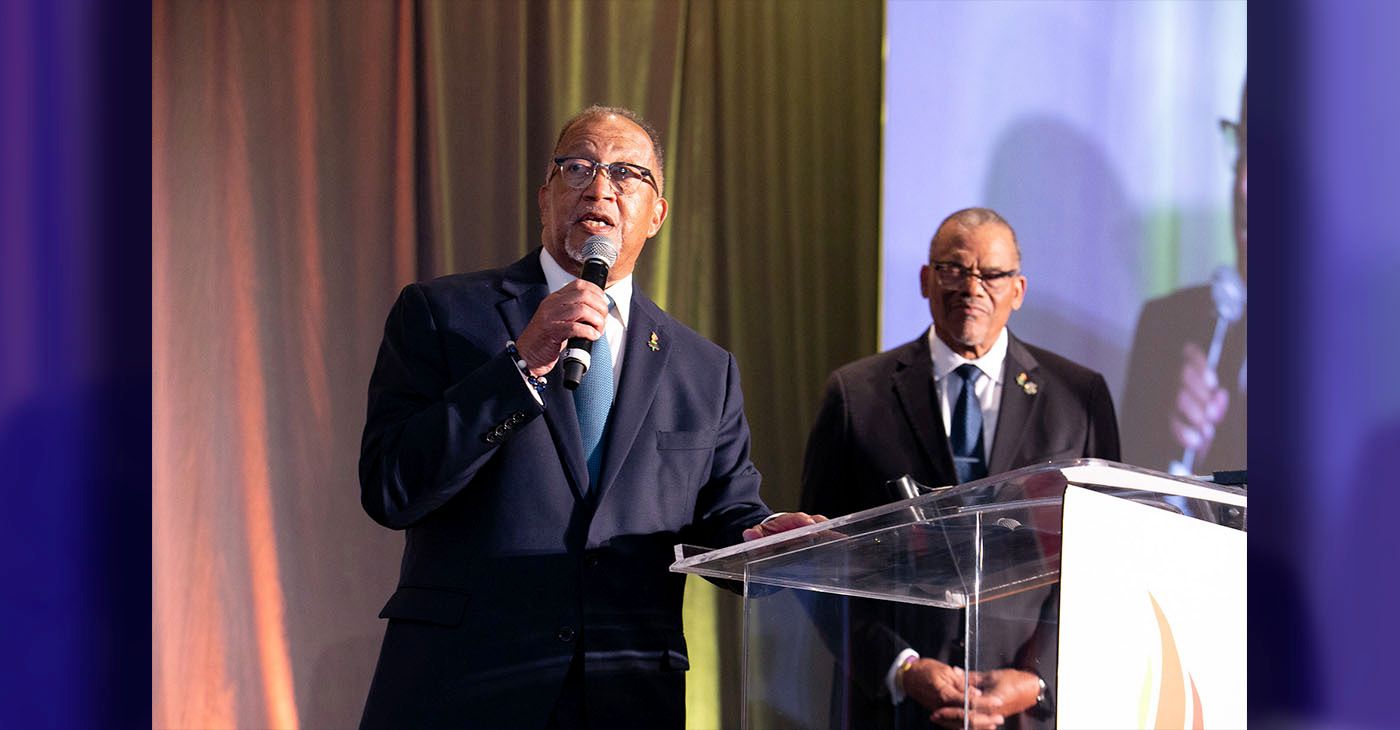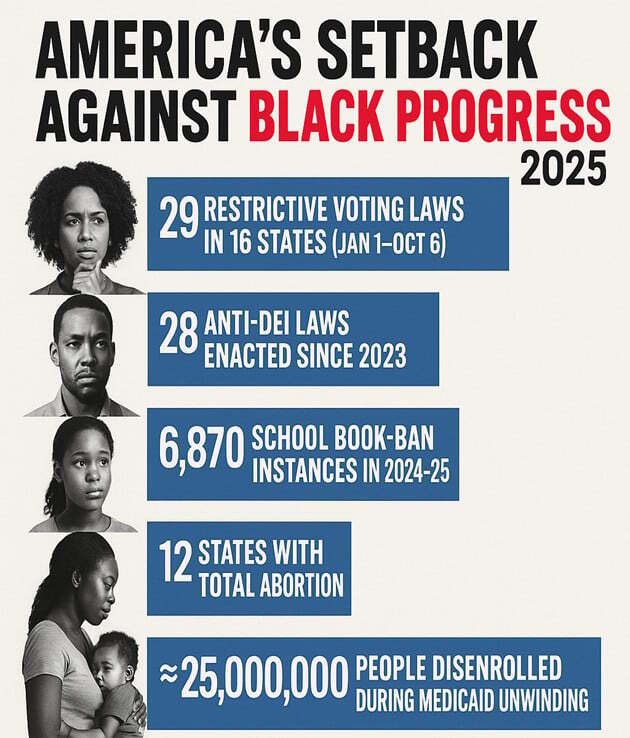- BlackVoter.Org
- Posts
- BlackVoter.Org
BlackVoter.Org


In his powerful piece, Reverend Dr. Benjamin Chavis highlights the vital shared legacies between Black and Jewish communities, calling for a renewed commitment to unity in the face of ongoing societal divides.
Drawing from his experiences, Chavis emphasizes the historical alliance forged during the civil rights movement, where figures like Dr. Martin Luther King Jr.
and Rabbi Abraham Joshua Heschel stood shoulder to shoulder against racism and antisemitism. Through initiatives like the Shared Legacies Professional-Development Workshop, educators are equipped to combat prejudice and foster empathy.
Chavis reminds us of the critical need to recognize this shared history, particularly in an age of misinformation, and the importance of collaboration for justice and equality. With powerful documentaries and educational programs fostering dialogue, Chavis believes that by remembering their intertwined past, these communities can pave the way for a more inclusive future.

Texas Democratic Rep. Jasmine Crockett is making waves with hints that she might run for the U.
S. Senate, potentially becoming the third Black woman to serve in this prestigious role.
She believes her chances are strong, referencing polls that suggest she could win the Democratic primary. Crockett aims to shake up the traditionally red narrative of Texas politics while fiercely advocating for her district.
Known for her outspoken critiques of her Republican colleagues, including a viral clash with Rep. Marjorie Taylor Greene, Crockett is ready to expand the electorate and amplify voices often sidelined in politics.
While some critics doubt her viability as a candidate, many see her as a powerful force for change. Her potential candidacy reflects a broader ambition to redefine representation in Texas, especially given the historical significance of Black women in leadership roles within the state.


The Trump administration's health care policies are hitting Black Americans hard, as diminished funding for the Affordable Care Act (ACA) threatens to double premiums and leave millions uninsured. With the government shutdown exacerbating financial pressures, many Black families face impossible choices between essentials like rent, groceries, and medical care.
The impending loss of vital ACA tax credits could result in a staggering 30% increase in uninsurance rates within the Black community, pushing 1.1 million individuals off their coverage.
As costs rise dramatically, families who previously found affordable plans may be forced to pay hundreds or even thousands more. Amid rising costs of living and plummeting wages, this manufactured crisis poses a dire threat to health care access for Black Americans.
Fred Redmond, a key labor leader, emphasizes the urgent need for government action to prioritize working people and stem this looming health care disaster.

Sati Smith, CEO of Diversified Members Credit Union (DMCU), has made history by becoming the first credit union CEO from Michigan to be inducted into the African American Credit Union Hall of Fame. This prestigious honor, presented by the African American Credit Union Coalition, recognizes individuals who have made significant contributions to the credit union movement and expanded financial access.
Smith’s inspiring journey—from a teller to CEO, while overcoming personal challenges as a single mother—illustrates her commitment to financial empowerment and community support. Under her leadership, DMCU serves nearly 30,000 members and focuses on inclusivity and generational wealth-building through various financial services.
Beyond her role at DMCU, Smith actively participates in community leadership, serving on the boards of important local organizations. Her induction will be celebrated at the AACUC event in Washington, D.
C., in March 2026, marking a proud moment for Michigan's credit union community.

In "Back to the Future Again?" Dr. Yaounde Olu explores the alarming sociological shifts in the United States, highlighting the potential threat to Black voting rights amid a changing political landscape.
The Supreme Court's expected ruling on Louisiana v. Callais could weaken vital protections from discriminatory practices in voting, ushering in a new wave of racial gerrymandering that dilutes Black voter power.
Olu critiques the political turmoil, including the recent NO KINGS demonstration against the Trump administration, the government shutdown caused by Congressional gridlock, and the pervasive spread of misinformation that fuels division among the populace. With healthcare and civic welfare at stake, Olu warns against the toxic regime’s backward trajectory and implores readers to push for progress rather than regress.
The article serves as a clarion call to unite against the dangers posed by current leadership, ensuring that the hard-won rights of the past remain intact.

The unemployment rate for Black Americans has surged to its highest level since the pandemic, now reaching 7.5%—more than double that of their white counterparts' 3.
7%. This troubling trend reflects broader job market challenges, with the Bureau of Labor Statistics reporting over 900,000 fewer jobs in the past year.
Experts highlight the disproportionate impact on Black workers, particularly in sectors like manufacturing and hospitality, which have seen significant cuts. Young Black workers are feeling the strain especially hard, with unemployment for ages 16-24 now exceeding 10%.
As economic uncertainties rise, analysts warn this reality may undermine job security and confidence within the community. The data serves as a stark reminder that economic shifts often hit marginalized groups first, emphasizing the need for targeted strategies to improve employment among Black Americans and bolster overall workforce stability.

The Supreme Court is poised to potentially further weaken the Voting Rights Act, a law designed to safeguard minority voting rights, as it hears a contentious case regarding Louisiana's congressional redistricting. The court, now with a conservative majority, is examining whether race can be considered in drawing new districts, particularly after Louisiana was asked to create two majority-Black districts following a legal challenge.
While the Trump administration's stance could allow states more discretion in partisan map-making, liberal justices warn that this could erode protections guaranteed by Section 2 of the Act. A broad ruling against race-based districting could diminish the representation of minority lawmakers, potentially reshaping political landscapes ahead of the 2026 elections.
The implications of this case are profound, with noteworthy discussions on constitutional equality echoing throughout. The court's decision could redefine the balance between race and politics in American democracy.

In 2025, America grapples with a stark regression in Black progress, marked by a deliberate campaign to erase and distort Black history and voices. This sobering article outlines 100 interconnected realities revealing the pervasive rollback of educational equity, voting rights, economic opportunities, and social justice.
From the rise of “divisive-concept” laws that curtail discussions on race to alarming disparities in wealth, health, and criminal justice, the article paints a grim picture of systemic inequities deepening across the nation. Yet, amid these setbacks, the spirit of resilience flourishes.
Educators, artists, and community leaders continue to fight for representation and justice, turning adversity into empowering acts of defiance. Each instance of suppressed history becomes a call to action, reminding us that while the challenges are formidable, the collective resolve of Black America is unwavering.
The message is clear: though progress may be under attack, the legacy of resistance and renewal remains ever strong.